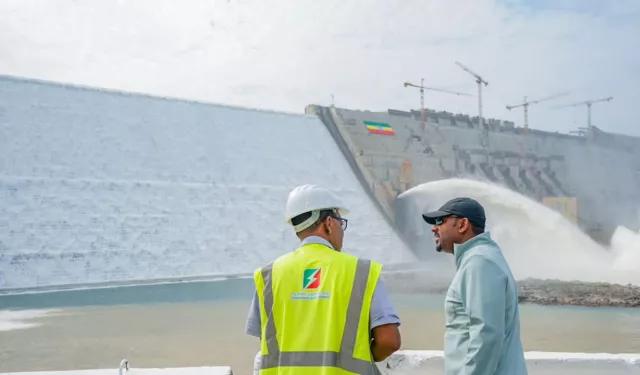Ethiopia will inaugurate the Grand Ethiopian Renaissance Dam (GERD) on Tuesday, marking the culmination of a 13-year bid to build Africa's largest hydroelectric project. The ceremony comes amid simmering geopolitical tensions with Egypt and Sudan over the dam's impact on downstream water security.
In a televised address from the dam site days before the ceremony, Ethiopian Prime Minister Abiy Ahmed mounted a staunch defense of the project, insisting it has not harmed Egypt or Sudan.
He reiterated that GERD's core purpose is electricity generation and regional development. “Ethiopia will not deprive any party of its water rights,” he said. “Equitable use of the Blue Nile is a natural right for us—just as it is for the downstream countries.”
Ethiopia has invited foreign delegations attending the second African Climate Summit, set for Sept. 8 to 10, to witness the inauguration, a diplomatic source in Addis Ababa told Al Manassa on the condition of anonymity. Kenyan President William Ruto is expected to headline the list of African leaders, alongside ambassadors and diplomats from several regional countries.
Ethiopian embassies abroad have recently launched publicity campaigns celebrating the dam’s opening. Images and video clips circulating online show Ethiopian flags draped across the structure and torrents of water gushing through its central spillway, the source noted.
Abiy first announced in early July that the GERD would be formally inaugurated in September, extending invitations to Egypt and Sudan despite the collapse of all previous negotiation tracks.
In contrast, Egyptian officials have described the dam’s impact as harmful and unilateral. An Egyptian Irrigation Ministry official familiar with the GERD file disputed Abiy’s assurances.
In comments to Al Manassa last week, the official said Ethiopia’s unilateral water storage has disrupted downstream flows. “The water retained was headed toward Sudan and then Egypt, but it has been held for years without yielding real benefits,” the source said.
The official, who also requested anonymity, said Egypt has spent around 500 billion Egyptian pounds on water-related infrastructure since 2014 to mitigate the impact. “Our concerns have not been alleviated,” the source said. “The only solution remains a binding agreement on refill and operation, especially during drought.”
In July, Egypt declared negotiations with Ethiopia dead, citing repeated failures. In a statement, the Irrigation Ministry vowed to closely monitor the GERD’s operation and defend its national and water security, as guaranteed under international law.
President Abdel Fattah El-Sisi echoed those sentiments last October, calling the Nile “a matter of life or death.” More than 98% of Egypt’s fresh water comes from the river.
In March, Egyptian Minister of Water Resources and Irrigation Hani Sewilam acknowledged the dam’s impact but argued Egypt had adapted at a steep cost. He stressed that the 2015 Declaration of Principles includes provisions for compensation if downstream countries suffer harm. “Egypt will demand accountability one day,” he said.
The GERD is a $4.2 billion mega-dam on the Blue Nile that will more than double Ethiopia's electricity output. It is expected to transform the country into a regional power exporter. The Blue Nile contributes about 85% of the Nile’s flow, making the project a flashpoint for Egypt and Sudan.
